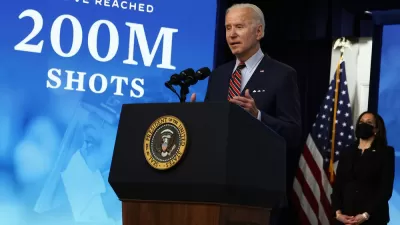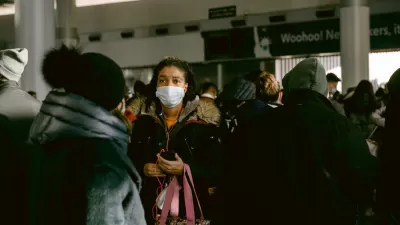So much for vaccines enabling the U.S. to achieve the cherished goal of herd immunity for COVID-19. It is becoming increasingly clear to many public health experts that likely will not happen, according to a New York Times global health reporter.

Two months ago many experts likened the U.S. position in the pandemic to a battle between virus variants and vaccines, as if one would emerge a winner. Mandavilli writes that a new consensus is emerging, one that entails living with the virus.
It is already clear, however, that the virus is changing too quickly, new variants are spreading too easily and vaccination is proceeding too slowly for herd immunity to be within reach anytime soon.
“The virus is unlikely to go away,” said Rustom Antia, an evolutionary biologist at Emory University in Atlanta. “But we want to do all we can to check that it’s likely to become a mild infection.”
Politico supported the endemic end game scenario in an article framing the pandemic challenge facing President Joe Biden in his next 100 days published just a few days before the Times' piece.
"[C]ontainment, not eradication, is the most realistic goal: Public health experts say the coronavirus is here for the long haul," wrote health care reporter, Dan Goldberg, and health care editor, Joanne Kenen on April 30.
Now, the challenge for Biden, his response team and state health officials will be managing the rolling series of outbreaks possibly driven by more dangerous virus variants, while avoiding the wishful thinking of the Trump administration, which downplayed the disease's lethality.
Not all experts agree
Dr. Ashish Jha, dean of the Brown University School of Public Health, expressed some skepticism on the notion that herd immunity is not achievable.
"We don't know if it's true," he told CNN New Day hosts John Berman and Brianna Keilar on May 3, but he did acknowledge that it would be "unfortunate" if the country weren't to reach herd immunity levels.
"At herd immunity levels, you really don't have to have any restrictions at all and the virus remains in check," said Jha.
"But that said, the experience from Israel is that once you get to about 50-55% of the population vaccinated, which a few states have now hit in the U.S., you really see case numbers plummet. So we may not get to zero, we probably won't, but if we can get infections under very low levels, most of us can get back to our lives in normal ways. I think we can probably live with that.
"With around 60 percent of its population vaccinated, Israel has managed to almost fully reopen its economy and crush the number of coronavirus cases and deaths to nearly zero," wrote for Vox in an endgame article referencing Mandavilli's piece.
The country still has some requirements in place — particularly indoor masking and vaccine passport requirements — but it’s much closer to normal than it could afford to be, with any guarantee of safety, just months ago.
Fauci gets last word
The nation's foremost public health expert, Dr. Anthony Fauci, appeared to agree with Jha.
“People were getting confused and thinking you’re never going to get the infections down until you reach this mystical level of herd immunity, whatever that number is,” he told Mandavilli.
“That’s why we stopped using herd immunity in the classic sense,” he added. “I’m saying: Forget that for a second. You vaccinate enough people, the infections are going to go down."
Related in Planetizen:
-
Will Israel Show Us the Way Out of the Pandemic? February 14, 2021
-
Post-Pandemic: Living with COVID, January 31, 2021
-
Pandemic Endgame: The Goalposts are Moving, December 30, 2020
- Pandemic Endgame, May 18, 2020
FULL STORY: Reaching ‘Herd Immunity’ Is Unlikely in the U.S., Experts Now Believe

Alabama: Trump Terminates Settlements for Black Communities Harmed By Raw Sewage
Trump deemed the landmark civil rights agreement “illegal DEI and environmental justice policy.”

Study: Maui’s Plan to Convert Vacation Rentals to Long-Term Housing Could Cause Nearly $1 Billion Economic Loss
The plan would reduce visitor accommodation by 25% resulting in 1,900 jobs lost.

Why Should We Subsidize Public Transportation?
Many public transit agencies face financial stress due to rising costs, declining fare revenue, and declining subsidies. Transit advocates must provide a strong business case for increasing public transit funding.

Paris Bike Boom Leads to Steep Drop in Air Pollution
The French city’s air quality has improved dramatically in the past 20 years, coinciding with a growth in cycling.

Why Housing Costs More to Build in California Than in Texas
Hard costs like labor and materials combined with ‘soft’ costs such as permitting make building in the San Francisco Bay Area almost three times as costly as in Texas cities.

San Diego County Sees a Rise in Urban Coyotes
San Diego County experiences a rise in urban coyotes, as sightings become prevalent throughout its urban neighbourhoods and surrounding areas.
Urban Design for Planners 1: Software Tools
This six-course series explores essential urban design concepts using open source software and equips planners with the tools they need to participate fully in the urban design process.
Planning for Universal Design
Learn the tools for implementing Universal Design in planning regulations.
Smith Gee Studio
Alamo Area Metropolitan Planning Organization
City of Santa Clarita
Institute for Housing and Urban Development Studies (IHS)
City of Grandview
Harvard GSD Executive Education
Toledo-Lucas County Plan Commissions
Salt Lake City
NYU Wagner Graduate School of Public Service





























